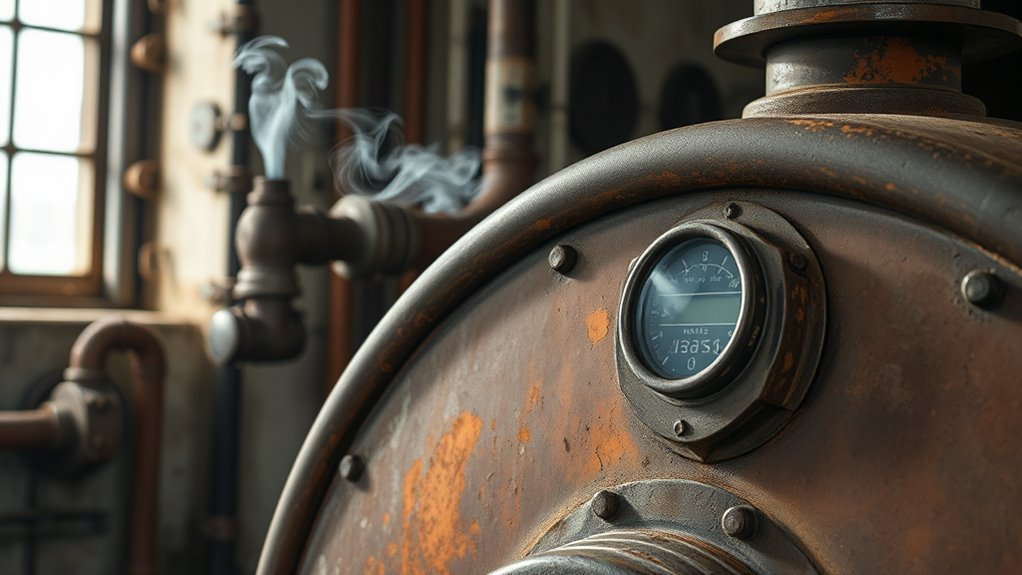Yes, a well-maintained boiler can last up to 20 years, particularly if it's a modern, high-efficiency model. Its longevity depends on several factors, including the type of boiler, regular maintenance practices, and your usage patterns. Gas boilers typically last 15 to 20 years, while oil-fired models can reach up to 25 years. Pay attention to signs of inefficiency, as these might indicate it's time for an upgrade. There's a lot more to reflect on about boosting your boiler's lifespan.
Key insights
- Gas boilers can last between 15 to 20 years with proper maintenance and care.
- Oil-fired boilers may achieve lifespans of up to 25 years when regularly serviced.
- Regular maintenance, including annual inspections, significantly enhances a boiler's longevity.
- Environmental efficiency and smart technology can contribute to extending a boiler's lifespan.
- Neglecting maintenance can reduce a boiler's lifespan and lead to frequent breakdowns.
Understanding Boiler Lifespan
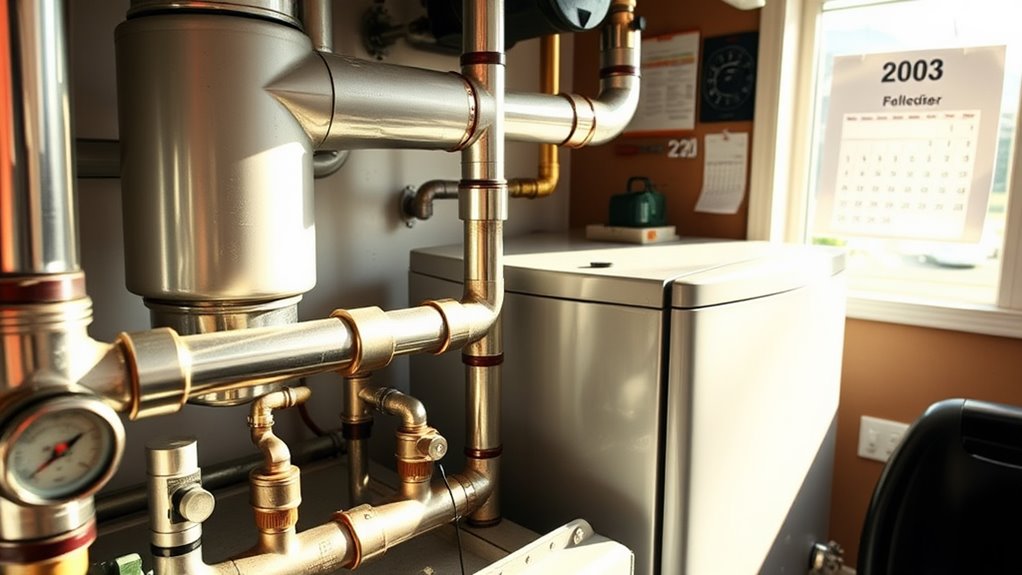
Understanding the lifespan of a boiler is essential for homeowners and facility managers alike, as it can greatly impact maintenance costs and efficiency. Typically, modern boilers can last between 10 to 20 years, depending on various factors such as usage, maintenance, and the type of boiler. With recent boiler technology advancements, you'll find units designed for increased durability and reliability. Additionally, energy efficiency improvements in newer models can lead to significant savings on utility bills. Regular maintenance, including inspections and timely repairs, can also extend your boiler's lifespan. By staying informed about these factors, you can make better decisions regarding upgrades and replacements, ensuring ideal performance and cost-effectiveness in the long run. Furthermore, engaging in regular servicing ensures safe and efficient operation while optimizing the boiler's performance.
Types of Boilers and Their Longevity
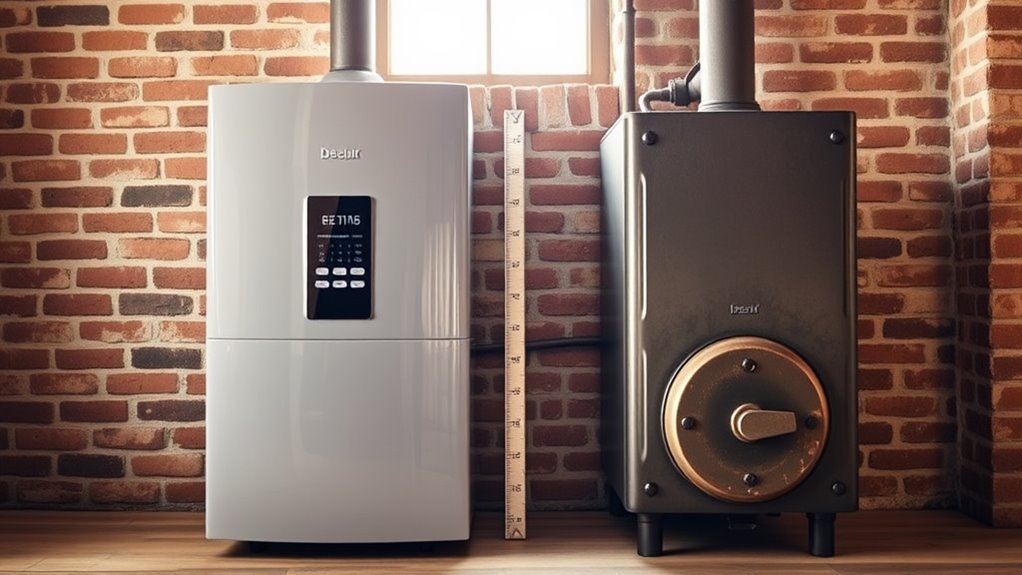
When considering the longevity of your boiler, it's crucial to understand the different types available and their average lifespans. Each boiler type, whether it's a combi, system, or conventional model, presents unique maintenance requirements that can greatly impact its durability. By comparing these factors, you can make an informed decision about which boiler may last the longest for your needs. Regular maintenance schedules are essential to ensure optimal performance and longevity of the system.
Boiler Types Overview
Boilers come in various types, each designed for specific heating needs and operating efficiencies. The most common types include conventional, combi, and system boilers. Conventional boilers, ideal for larger homes, utilize separate hot water cylinders, enhancing boiler efficiency. Combi boilers, on the other hand, provide instant hot water and are perfect for smaller spaces, minimizing energy waste. System boilers integrate features of conventional units but eliminate the need for a separate cold water tank, showcasing advanced boiler technology. Each type has unique advantages, and understanding these can help you choose the right one for your needs. When evaluating options, consider factors like boiler efficiency and your home's requirements to guarantee peak performance and longevity. Additionally, proper heating maintenance is essential for extending the lifespan of any boiler system.
Average Lifespan Comparison
The lifespan of a boiler can vary considerably based on its type and how well it's maintained. Generally, gas boilers tend to last around 15 to 20 years, while oil-fired models can reach up to 25 years. Electric boilers typically have a shorter lifespan, averaging 10 to 15 years. Each type's longevity hinges on its boiler efficiency and energy consumption. High-efficiency condensing boilers, for instance, not only reduce energy consumption but often come with longer warranties, indicating their durability. Regular assessments and timely repairs can further extend a boiler's lifespan, ensuring peak performance. Understanding these average lifespans helps you make informed decisions about which boiler system suits your needs and budget. Additionally, regular inspection schedules can play a crucial role in maintaining optimal performance and longevity.
Maintenance Impact Factors
Proper maintenance plays an essential role in determining how long different types of boilers can last. Regular maintenance schedules help you identify issues early, ensuring peak boiler efficiency. For instance, gas boilers may require annual inspections to check for leaks and proper combustion, while oil boilers need regular cleaning to prevent soot buildup. Neglecting maintenance can lead to reduced efficiency and premature failure. Additionally, the type of boiler affects longevity; while cast iron models can last longer, high-efficiency condensing boilers often require more frequent servicing. By adhering to manufacturer guidelines and staying on top of maintenance tasks, you can greatly enhance the lifespan of your boiler, potentially reaching or exceeding that 20-year mark. Regularly monitoring boiler pressure levels can also prevent issues that may shorten the lifespan of your system.
Factors That Affect Boiler Life
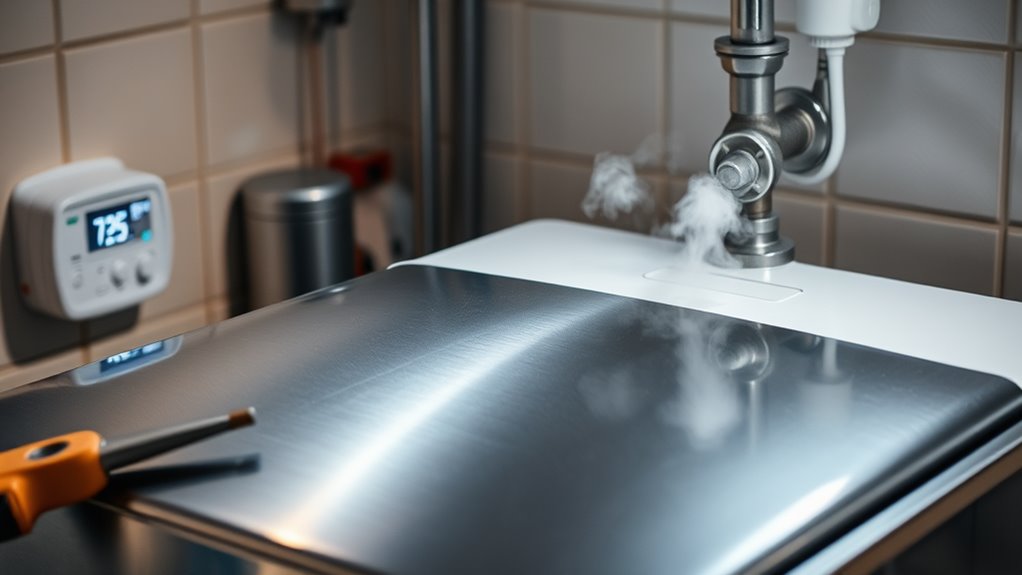
While many people assume that regular maintenance alone determines a boiler's lifespan, several interconnected factors play an essential role in its longevity. Consider the following aspects:
- Boiler Materials: High-quality materials can resist corrosion and wear, extending your boiler's life.
- Installation Quality: A properly installed boiler guarantees peak performance and minimizes stress on components, affecting longevity.
- Operating Conditions: Factors like water hardness, fuel type, and environmental conditions can accelerate wear and tear.
Additionally, pressure settings and usage patterns greatly influence how long your boiler lasts. Understanding these factors allows you to better anticipate potential issues and make informed decisions about your boiler's future. Regular preventative maintenance can also significantly contribute to extending the life of your boiler. Keep an eye on age indicators to assess when replacement might be necessary.
The Role of Regular Maintenance

Regular maintenance plays a vital role in maximizing your boiler's lifespan. Implementing preventive measures, such as regular inspections and cleaning, can help you identify potential issues before they escalate. Establishing maintenance routines is essential; schedule annual check-ups with a qualified technician to guarantee peak performance. During these visits, the technician will assess critical components, such as the heat exchanger and safety valves, making necessary adjustments or repairs. Additionally, flushing the system periodically can remove sediment buildup, enhancing efficiency. By prioritizing these maintenance tasks, you not only extend your boiler's life but also improve its efficiency, reducing energy costs. Remember, a well-maintained boiler operates safely and reliably, giving you peace of mind in your home. Furthermore, consider commercial power flushing as an effective method to restore and maintain heating system efficiency.
Signs Your Boiler Needs Attention
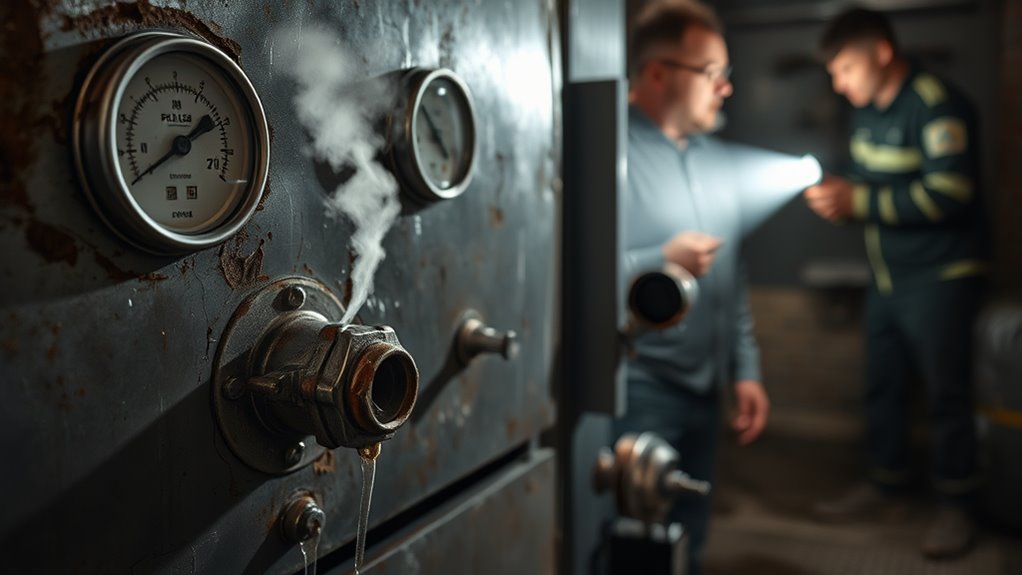
If you notice unusual noises coming from your boiler, it's a sign that something may be wrong. Inconsistent heating performance and frequent repairs also indicate that your system needs attention. Ignoring these warning signs can lead to more significant issues down the line. Additionally, a persistent Ea error code often signifies a failure to ignite, which could disrupt your heating system's functionality.
Unusual Noises Occurring
Unusual noises coming from your boiler can signal potential issues that require immediate attention. Ignoring these sounds could lead to more significant problems down the line. Here are three common noises you should watch for:
- Boiler vibrations: Excessive vibrations can indicate loose components or an imbalance within the system, suggesting a need for inspection.
- Unusual rattling: This sound might signal loose parts or debris within the boiler, potentially compromising its efficiency or safety.
- Banging or clanking: This could mean water is boiling too rapidly, causing pressure issues that may necessitate professional assessment. It's important to understand that regular maintenance can help prevent these noises from occurring in the first place.
If you hear any of these noises, it's best to consult a technician to avoid more costly repairs in the future.
Inconsistent Heating Performance
Have you noticed that some rooms in your home feel colder than others? This inconsistent heat can signal that your boiler needs attention. When you experience fluctuating temperatures, it often indicates issues like air trapped in the system, radiator malfunctions, or even a failing pump. These problems can lead to uneven heating, making it harder for your boiler to maintain a comfortable environment. It's vital to address these inconsistencies promptly, as they can escalate into more significant issues if ignored. Regular maintenance checks can help identify the root cause of the problem, ensuring your heating system operates efficiently. Furthermore, common error codes can provide insights into specific issues affecting your boiler's performance. Don't let inconsistent heating compromise your comfort—monitor your system and seek professional help when needed.
Frequent Repairs Needed
When your boiler requires frequent repairs, it's a clear indication that something is wrong. High repair frequency not only disrupts your home's comfort but also leads to significant repair costs over time. Here are three signs your boiler needs attention:
- Recurring Breakdowns: If you're calling for repairs every few months, it's time to evaluate its condition.
- Unusual Noises: Strange sounds, like banging or hissing, often signal deeper issues that need addressing.
- Increased Energy Bills: A sudden spike in your heating costs can indicate inefficiency, often due to ongoing mechanical problems.
Ignoring these signs can lead to more extensive damage and ultimately, a shorter lifespan for your boiler. Don't hesitate to seek professional help when you notice these issues.
How to Extend Your Boiler's Life
To guarantee your boiler operates efficiently and lasts as long as possible, regular maintenance is essential. Start by checking the pressure regularly; maintaining ideal levels enhances boiler efficiency. Inspect the flue and ventilation systems to verify there are no blockages, as this can lead to unsafe conditions and reduced performance. Clean the filters and radiators periodically to allow proper airflow and heat distribution. You should also monitor the water quality to prevent corrosion; using a water treatment system can greatly extend your boiler's lifespan. Consider upgrading to modern heating technology, which often includes built-in efficiency features. Finally, keep an eye on any unusual noises or performance drops—addressing these early can prevent costly repairs down the line.
Importance of Professional Servicing
While regular maintenance can help prolong your boiler's lifespan, professional servicing is essential for ensuring peak performance and safety. Relying solely on DIY efforts can lead to overlooked issues that might escalate into major problems. Here are three reasons why you should prioritize professional servicing:
- Thorough Professional Inspections: Technicians can identify hidden faults and wear that you may miss during routine check ups.
- Expert Knowledge: Professionals possess the expertise to diagnose and resolve complex issues efficiently, ensuring your boiler runs smoothly.
- Safety Assurance: Regular servicing minimizes risks related to gas leaks or carbon monoxide exposure, providing peace of mind.
Investing in professional servicing not only enhances performance but also extends your boiler's life, ensuring reliable heating for years to come.
Common Boiler Problems and Solutions
You might encounter several common boiler problems that can impact its efficiency and lifespan, such as frequent pilot light issues, low water pressure, and unusual noises. Addressing these problems promptly can prevent further damage and guarantee your boiler operates effectively. Let's explore these issues and their solutions to keep your system running smoothly.
Frequent Pilot Light Issues
Frequent pilot light issues can indicate underlying problems with your boiler, leading to inefficient operation or complete failure if not addressed promptly. You should focus on pilot light troubleshooting to identify the common causes of these issues:
- Drafts: Airflow disruptions can extinguish your pilot light. Verify there's no breeze from windows or vents.
- Thermocouple Malfunction: A faulty thermocouple may not sense the flame, causing the pilot light to go out. Replace it if necessary.
- Clogged Pilot Orifice: Dirt or debris can block the pilot orifice, preventing proper ignition. Clean it to verify a steady flame.
Low Water Pressure
Low water pressure can greatly impact your boiler's efficiency and performance, leading to inadequate heating and potential system damage. If you're experiencing low pressure issues, it's crucial to check the pressure gauge on your boiler. Ideally, it should read between 1 and 1.5 bar. If the pressure drops below this range, you may need to top it up using the filling loop. Additionally, inspect for leaks in the system, as they can contribute to pressure loss. Ensuring proper pressure regulation is key to maintaining boiler health. If you've addressed these aspects and still encounter problems, consulting a professional technician can help diagnose underlying issues, ensuring your boiler operates safely and effectively.
Boiler Noise Problems
While a well-maintained boiler should operate quietly, unusual noises can indicate underlying issues that require attention. If you're hearing strange sounds, it's essential to address them promptly to avoid further damage. Here are some common boiler noise problems:
- Boiler Humming Sounds: These may suggest electrical issues or a malfunctioning transformer. Check connections and consider consulting a technician.
- Boiler Vibration Issues: Excessive vibration can indicate loose components or an unbalanced fan. Tighten any loose parts and inspect the fan for proper alignment.
- Banging or Gurgling Noises: Often a sign of trapped air or sediment buildup. Bleed your radiators and flush the system to improve efficiency.
Ignoring these noises can lead to costly repairs, so stay proactive with your boiler maintenance.
Energy Efficiency and Its Impact
Energy efficiency plays an essential role in determining a boiler's lifespan and overall performance. When you choose a boiler with high efficiency ratings, you're investing in a system that consumes less fuel, reducing operational costs and environmental impact. Implementing energy conservation strategies, such as regular maintenance and proper insulation, can greatly enhance your boiler's efficiency. A well-maintained boiler not only operates more effectively but also extends its life expectancy. By monitoring efficiency ratings, you can make informed decisions about upgrades or replacements when necessary. Ultimately, focusing on energy efficiency guarantees your boiler runs at its best, saving you money and resources in the long run while contributing to a sustainable future.
The Cost of Boiler Repairs vs. Replacement
When deciding between boiler repairs and replacement, understanding the costs involved is essential. Repair costs can add up quickly, especially if your boiler requires frequent maintenance. Here's what you should contemplate:
- Age of the Boiler: Older units often need more repairs, increasing overall costs.
- Frequency of Breakdowns: If you find yourself calling for repairs multiple times a year, it might be time to contemplate a replacement.
- Energy Efficiency: Newer models typically offer better efficiency, potentially reducing your long-term expenses.
On average, repair costs might seem cheaper initially, but replacement expenses can be more economical in the long run, especially when factoring in energy savings and reliability. Evaluate your situation carefully before making a decision.
Seasonal Maintenance Tips
To guarantee your boiler operates efficiently and lasts as long as possible, seasonal maintenance is essential. Schedule regular boiler inspections to identify potential issues before they escalate. During these inspections, a technician will check for leaks, verify proper ventilation, and assess the pressure levels. Don't overlook seasonal check-ups; they help enhance performance and energy efficiency.
You should also clean or replace the air filters, as dirty filters can hinder airflow and cause overheating. Additionally, bleed radiators to remove trapped air, verifying even heat distribution. Finally, assess the thermostat settings to maintain ideal comfort levels. By following these seasonal maintenance tips, you'll keep your boiler running smoothly and extend its lifespan considerably.
The Impact of Water Quality on Boiler Health
Regular maintenance is only part of the equation when it comes to the longevity of your boiler; water quality plays a significant role as well. Poor water quality can lead to scale buildup and corrosion, ultimately shortening your boiler's lifespan. Here are three key factors to evaluate:
- Water Hardness: Hard water contains high mineral levels, which can cause scaling inside your boiler, affecting efficiency.
- Chemical Additives: Using appropriate chemical additives can help mitigate corrosion and scaling, enhancing the overall health of your boiler.
- pH Levels: Maintaining balanced pH levels in the water prevents acid-related deterioration, ensuring your boiler operates smoothly.
Upgrading Your Boiler: When Is It Time?
How do you know when it's time to upgrade your boiler? One key indicator is declining boiler efficiency. If your energy bills are increasing without a change in usage, your boiler may no longer operate efficiently. Age is another important factor; if your boiler is over 15 years old, consider replacement, as newer models often offer better efficiency ratings. Frequent repairs can also signal that it's time for an upgrade—if you're spending more on fixes than on your monthly heating costs, a replacement is advisable. Additionally, if you notice inconsistent heating or loud noises, these are replacement indicators that shouldn't be ignored. Assess these factors to determine if upgrading your boiler is the right choice for your home.
The Importance of Proper Installation
When you invest in a new boiler, proper installation is vital for guaranteeing ideal performance and longevity. Utilizing the right installation techniques can prevent issues that may lead to costly repairs down the line. Here are three key considerations:
- Hire Qualified Professionals: Always seek professional advice from certified technicians to confirm compliance with local codes and regulations.
- Correct Sizing: Verify your boiler is appropriately sized for your space to optimize energy efficiency and heating capacity.
- Proper Ventilation: Adequate ventilation is essential for safe operation and preventing carbon monoxide buildup.
Boiler Brands Known for Longevity
When choosing a boiler, some brands are renowned for their durability and longevity. Understanding which manufacturers consistently produce reliable models can help you make an informed decision. Additionally, regular maintenance plays an essential role in extending the lifespan of your boiler, regardless of the brand you select.
Top Long-lasting Brands
Selecting a boiler brand known for longevity can greatly impact your investment's lifespan and efficiency. When it comes to boiler efficiency and brand reliability, consider the following top long-lasting brands:
- Vaillant: Renowned for its energy-efficient models, Vaillant offers durability and excellent performance over time.
- Worcester Bosch: This brand consistently ranks high for reliability and longevity, backed by a strong warranty and customer service.
- Ferroli: Known for its robust construction, Ferroli boilers provide efficient heating solutions that stand the test of time.
Investing in one of these brands can help guarantee you get the most out of your boiler, maximizing both its lifespan and operational efficiency. Choose wisely for a long-term solution.
Maintenance for Longevity
Even the most reliable boiler brands require proper maintenance to achieve their full lifespan potential. To guarantee peak boiler efficiency, adhere to regular maintenance schedules outlined by the manufacturer. This typically includes annual inspections, cleaning of components, and checking for any leaks or wear.
Neglecting these tasks can lead to decreased performance and premature failure. Additionally, flushing the system periodically removes sediment buildup, which can hinder efficiency.
You should also monitor the pressure and temperature settings regularly, adjusting them as necessary. By maintaining a consistent maintenance routine, you not only extend your boiler's life but also enhance its performance, ultimately saving you money on energy bills and repairs. Prioritize maintenance to enjoy a boiler that lasts well into its second decade.
Understanding Boiler Warranties
How well do you understand the importance of boiler warranties? They're essential for protecting your investment and guaranteeing your boiler operates efficiently over time. Here are three key aspects of boiler warranties you should know:
- Warranty Coverage: Understand what components are covered. Most warranties include major parts like the heat exchanger but may exclude others.
- Warranty Duration: Check how long the warranty lasts. Many manufacturers offer different durations, typically ranging from 1 to 10 years, depending on the model.
- Claim Process: Familiarize yourself with the claim process. Knowing how to file a claim and the required documentation can save you time and stress if issues arise.
A thorough understanding of these factors guarantees your boiler remains protected throughout its lifespan.
How Usage Patterns Affect Boiler Lifespan
Your boiler's lifespan can considerably vary based on how often you use it, the maintenance practices you follow, and the settings you choose for its operation. Frequent use without proper care can lead to wear and tear, while regular maintenance can enhance its longevity. Additionally, operating at higher temperatures may stress the system more than necessary, impacting its overall durability.
Frequency of Use
Boilers, like any mechanical system, respond directly to usage patterns, which greatly influence their lifespan. The frequency of use and the intensity of that usage are critical factors. Here are three key points to reflect upon:
- High Frequency: If you use your boiler frequently, it will experience more wear and tear, potentially shortening its lifespan.
- Usage Intensity: High-intensity usage, such as running the boiler at maximum capacity for extended periods, can increase stress and lead to premature failure.
- Inconsistent Use: Boilers that are used sporadically may develop issues like corrosion or sediment buildup, affecting their efficiency and longevity.
Being aware of these frequency patterns can help you make informed decisions about your boiler's operation and maintenance.
Maintenance Practices
While frequency of use plays a considerable role in a boiler's lifespan, proper maintenance practices are equally essential in ensuring ideal performance and longevity. Regular preventative care can greatly extend your boiler's operational life. Make it a habit to perform routine checks, inspecting components like the pressure gauge, water levels, and flue for any signs of wear or blockage. Additionally, flushing the system periodically can prevent sediment buildup, which can lead to inefficiency and overheating. Don't overlook the importance of checking safety valves and ensuring electrical connections are secure. By committing to these maintenance practices, you not only enhance your boiler's efficiency but also minimize the risk of costly breakdowns, ultimately protecting your investment for years to come.
Operating Temperature Settings
When operating a boiler, selecting the right temperature settings is essential, as it directly influences its lifespan. Proper temperature control enhances operating efficiency and prevents unnecessary wear. Here are three key considerations for managing your boiler's temperature settings:
- Optimal Range: Maintain temperatures between 180°F to 200°F for maximum efficiency. Too high can strain components, while too low may lead to condensation and corrosion.
- Seasonal Adjustments: Modify settings based on seasonal demands. Lower temperatures in warmer months can reduce stress on the system.
- Regular Monitoring: Frequently check your temperature settings and adjust as needed to maintain efficiency and prolong lifespan.
The Benefits of Smart Thermostats
Smart thermostats offer numerous advantages that can greatly enhance your home's heating efficiency and comfort. By utilizing smart energy management, these devices allow you to monitor and control your heating system remotely, ensuring peak performance. With programmable settings, you can easily schedule heating times based on your routine, minimizing energy waste when you're not home. This feature not only saves you money on energy bills but also prolongs the lifespan of your boiler by preventing unnecessary strain. Additionally, many smart thermostats learn your preferences over time, automatically adjusting temperatures for maximum comfort. Essentially, investing in a smart thermostat is a practical step toward achieving greater control and efficiency in your heating system.
Environmental Considerations for Older Boilers
As older boilers age, they often become less efficient and can contribute to increased greenhouse gas emissions. This negatively affects the environmental impact and raises your energy consumption. Here are three key considerations for older boilers:
- Efficiency Decline: As a boiler ages, its efficiency drops, leading to higher fuel usage and emissions.
- Maintenance Requirements: Older models may require more frequent repairs, which can further exacerbate their environmental footprint.
- Alternative Options: Upgrading to a modern, energy-efficient boiler can greatly reduce energy consumption and minimize your carbon footprint.
Preparing for Boiler Replacement
Preparing for boiler replacement involves several critical steps to guarantee a smooth changeover and peak performance of your new system. First, assess your current boiler's condition and determine your replacement timeline. This helps you plan accordingly and avoid unexpected downtime. Next, research suitable options for boiler installation based on your home's size and heating needs. Consult with professionals to verify you select the right model and efficiency rating. Don't forget to check local regulations and permits required for installation. Once you've chosen a contractor, schedule the installation date, ensuring there's minimal disruption to your daily routine. Finally, prepare your home by clearing the area around the boiler for safe access during installation. Proper preparation makes all the difference.
Frequently Asked Questions
Can I Install a Boiler Myself to Save Costs?
You might consider DIY installation to save costs, but it's essential to assess your skills and knowledge first. Boilers require precise installation to function safely and efficiently. Incorrect setup can lead to significant issues, including safety hazards and costly repairs. It's often advisable to hire a professional, even if it seems like more expense upfront. This guarantees compliance with local codes and assures your system runs at its best for years to come.
What Should I Do if My Boiler Is Leaking?
If your boiler's leaking, you should act quickly. Start with leak detection; check all visible pipes and connections for moisture. If you find the source, consider your repair options. Tightening connections or replacing gaskets might work for minor leaks. However, for significant issues, it's best to consult a qualified technician. They can assess the situation and recommend the most effective repair methods to guarantee your system operates safely and efficiently.
How Does Boiler Size Impact Its Lifespan?
Boiler size greatly impacts its lifespan and efficiency. An appropriately sized boiler guarantees peak performance, reducing strain on the system. If it's too large, it cycles on and off frequently, which can lead to wear and tear. Conversely, a small boiler may struggle to meet demand, resulting in overworking. Regular maintenance practices, such as checking for leaks and cleaning components, further enhance boiler efficiency and longevity, assuring you get the most out of your investment.
What Are the Signs of a Poorly Installed Boiler?
If you're noticing inconsistent heating, strange noises, or frequent repair needs, your boiler might be poorly installed. Installation mistakes can severely affect boiler efficiency, leading to higher energy bills and decreased performance. Look for signs like water leaks or uneven temperature distribution throughout your home. If you see these issues, it's essential to consult a professional to evaluate the installation and guarantee your boiler operates safely and efficiently.
Can I Switch Boiler Types During Replacement?
Yes, you can switch boiler types during replacement. When considering different boiler types, such as combi, system, or conventional boilers, evaluate your home's heating needs and existing infrastructure. Each type has unique benefits and drawbacks, so it's crucial to explore your replacement options. Consulting a qualified technician can help you determine the best fit for efficiency and performance. Make sure your new choice aligns with your energy goals and installation requirements.
Summary
In summary, while a boiler can last up to 20 years with proper care, its longevity depends on various factors like type, maintenance, and usage patterns. Regular servicing helps prevent issues and extends life. Pay attention to signs of wear and consider upgrades, like smart thermostats, to improve efficiency. As your boiler ages, be proactive about replacement planning to guarantee peak performance and reduce environmental impact. Stay informed to make the best choices for your heating needs.

